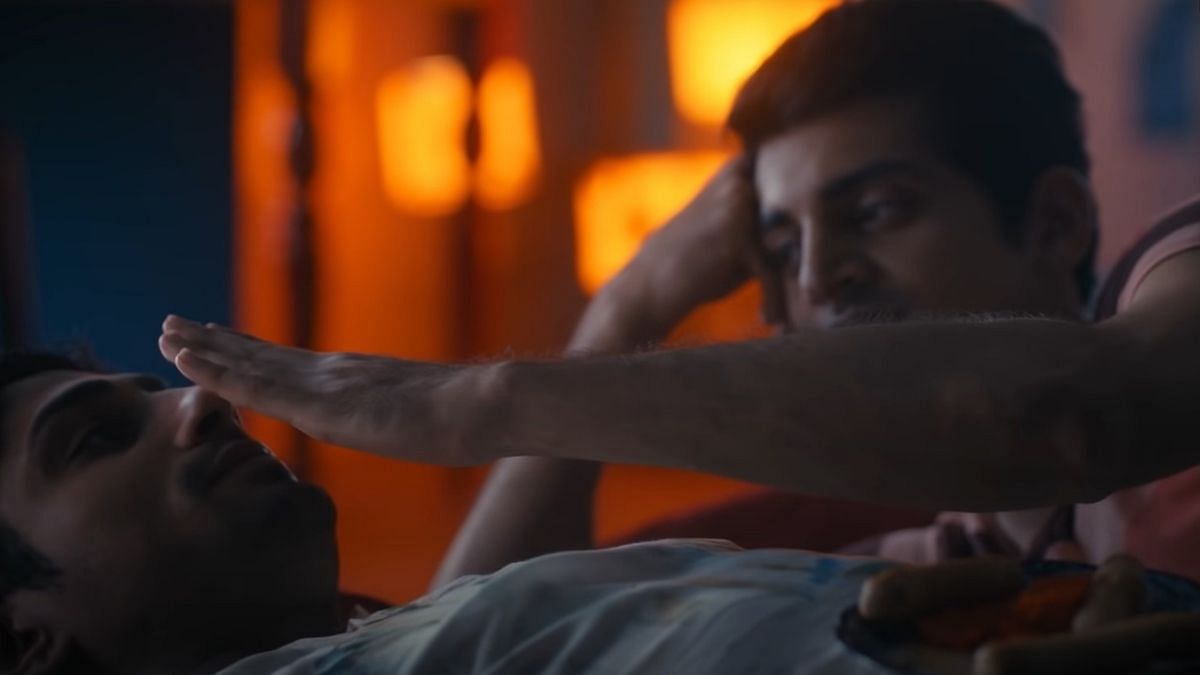Cobalt Blue (2022) is a tender and introspective Indian drama that unfolds in a conservative Marathi household during the 1990s. The story follows two siblings—Tanay, a soft-spoken aspiring writer, and Anuja, his confident, free-spirited sister—whose quiet lives are disrupted by the arrival of a mysterious paying guest. This stranger, a young man with a magnetic presence and a bohemian soul, gradually captures the hearts of both siblings, igniting a love triangle that neither of them saw coming. As affection turns into obsession and admiration bleeds into longing, their emotions begin to unravel under the weight of unspoken desires.
Tanay, sensitive and poetic, develops a deep emotional and romantic connection with the guest, who awakens in him a side he’s long repressed. Their relationship becomes a secret sanctuary for Tanay, a rare space where he feels understood and alive. Meanwhile, Anuja is drawn to the same man’s charm and artistic allure, interpreting his attention as something equally meaningful. Without knowing they are both chasing the same person, the siblings begin to build parallel dreams around him. But when the truth inevitably surfaces, it throws their entire family into turmoil and shatters the fragile illusion of control they thought they had.
The film weaves themes of queerness, heartbreak, and rebellion into a quiet storm. It doesn't rush; it lingers in silences, in stolen glances, in the empty spaces of a home that begins to feel foreign. The gorgeously muted color palette, especially the recurring shades of blue, reflects the melancholy of love that can’t speak its name. The gorge metaphor in the story isn't physical—it’s emotional, representing the growing gap between siblings, between expectations and reality, between who they are and who they’re allowed to be. The narrative lets you sit with the discomfort of longing, confusion, and loss, while never offering an easy resolution.

What sets Cobalt Blue apart is its commitment to emotional honesty. Instead of indulging in melodrama, the film quietly chips away at social norms, showing how love—especially queer love—exists even in the most rigid settings, though often in secret. The character of Tanay is especially poignant, as he must face not only heartbreak but the painful awareness that his love may never be acknowledged. Anuja, on the other hand, responds to betrayal with fiery independence, showing two very different but equally valid forms of heartbreak. The guest, never fully revealed or explained, becomes a mirror for both of them—reflecting what they long for, but also what they fear.
By the end of the film, nothing is the same. The family dynamic is altered forever, and both Tanay and Anuja are forced to grow in different ways. Cobalt Blue doesn’t offer closure in the traditional sense, but it does offer a sense of personal awakening. It’s a film about discovering oneself through love and pain, and about how the same person can mean vastly different things to two people. Quiet, atmospheric, and emotionally resonant, this is a story that lingers long after the credits roll—a story about hidden love, the beauty of longing, and the silent courage it takes to feel deeply in a world that often asks you not to.





